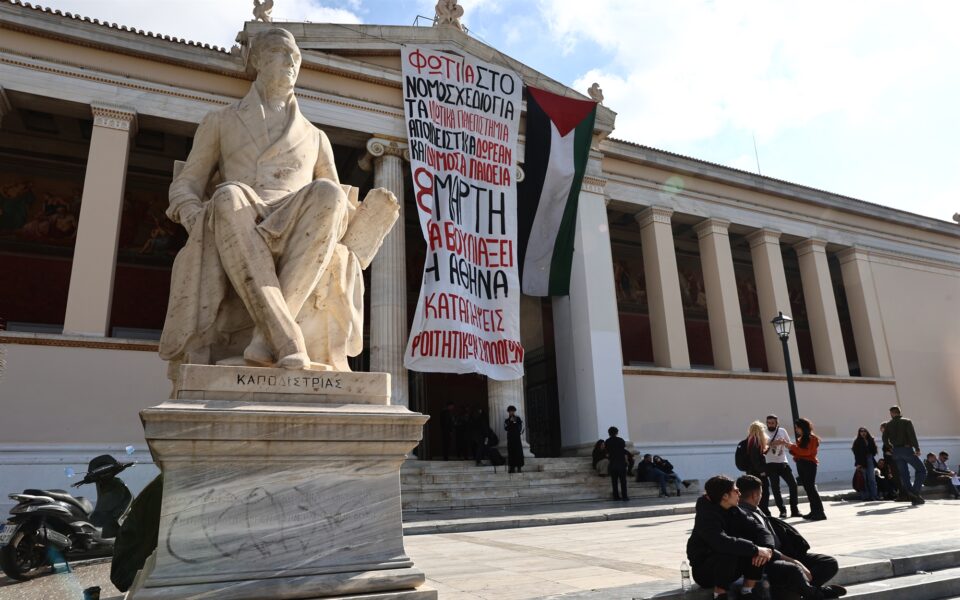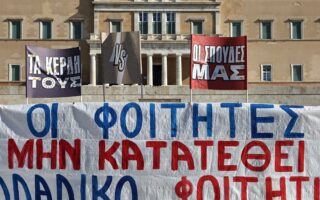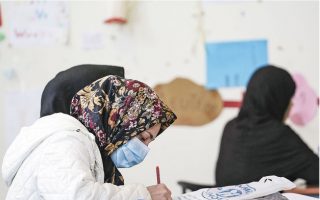Student sit-ins: A Greek user manual

Occupation: This pivotal term traces back to the distant 1973, resonating with undiminished intensity to the present day. Campuses worldwide were ablaze, the culmination of which would be witnessed in Athens: the events at the Law School in February and March, followed by those at the Polytechnic later on, notably the famous three-day occupation in November that ended in bloodshed. Indeed, “The Strawberry Statement,” the groundbreaking film that profoundly impacted the youth during Greece’s junta era, offered a compelling portrayal of the anti-war student strike at Columbia University in New York just a few years prior.
The practice, therefore, was imported from outside. However, the Polytechnic crafted a heroic imaginary, engaging directly with the local tradition of the “free besieged.” During the post-dictatorship era, known as the ‘Metapolitefsi,’ the memory of the now mythologized November uprising would formulate the code of challenge against authority and establish the grammar and syntax for how the youth protest would be articulated in Greece. The occupations of the Chemistry Department and the Law School in 1979, protesting against the infamous Law 815, which aimed to “bring order to universities,” marked an era, still characterized by the activism of leftist student organizations of all kinds. It is noteworthy that the Communist Party of Greece (KKE) vehemently criticized the occupations at the time as a form of struggle that “did not contribute to today’s struggles.” Eventually, Konstantinos Karamanlis withdrew the law in 1980.
The very concept of university asylum, which was violated by the police raid on the Aristotle University of Thessaloniki just a few days before the April 1967 coup, resulting in the complete abolition of asylum legislation for years, experienced a resurgence in the early years of the Metapolitefsi. In 1982, with the introduction of the “framework law,” the then dominant PASOK party established a rigorous legal framework that significantly impeded any encroachment on asylum by the police. Meanwhile, the law granted students the right to participate in university administration, a progressive demand for the time, albeit with an unfortunate outcome. Following a series of fiery occupations of the Polytechnic by anarchists, there were student and high school student occupations protesting the “Kontogiannopoulos law,” named after New Democracy education minister Vassilis Kontogiannopoulos, during the Konstantinos Mitsotakis government.
This law was viewed as an authoritarian regression and the occupations left a lasting impact. The reform was eventually revoked, while a similar fate awaited that of another, this time socialist, education minister, Gerasimos Arsenis, who, in accordance with a popular student slogan of the time, was compelled to “behave” by the end of the decade. Even the popular sitcom “Oi Aparadektoi” (The Unacceptables), which broke television records in the 1990s, featured an episode where Spyros, one of the main characters who often boasted about being “inside the Polytechnic” in 1973, has an unfortunate experience when he gets too close to an occupation by young people – he gets smothered in yogurt.
In 2007, the “Giannakou law,” dubbed after the late conservative education minister Marietta Giannakou, was repealed in the wake of a fresh wave of protests against the proposed amendment of the Constitution’s contentious article concerning private universities by then prime minister Kostas Karamanlis, initially with the approval of socialist opposition leader George Papandreou. Extensive protests across almost all schools nationwide forced the otherwise steadfast minister to retract the legislation, given the delayed reversal of PASOK, despite its initial advocacy for the constitutional amendment. This heralded the events of December 2008 and the subsequent crisis. Is this all a Greek peculiarity? Clearly not. It’s no coincidence, for example, that the implementation of the so-called “Bologna Process” for higher education led to significant occupations of Italian campuses in 2009-10.
Following substantial waves of occupations in the 1980s and 1990s, French student mobilizations, including the occupation of the Sorbonne for the first time since May 1968, resulted in the overturning of laws regarding the first employment contract by the Chirac-Villepin government. More recently, in 2023, German universities were occupied by students protesting government inaction on climate change, with similar movements occurring in universities across Portugal, Spain, Belgium and the Czech Republic. The slogan “End Fossil – Occupy!” has become emblematic.
What is perhaps more bewildering here is the fact that the issues in Greece in recent years are almost identical (intensification, asylum, Article 16), whereas in other countries the range of actions and the content of student movements evolve and expand. This may be what contributes to the sense of deja vu and the constant repetition; akin to the monotonous echo of their slogans.
Kostis Kornetis is a professor of contemporary history at the Autonomous University of Madrid (Universidad Autonoma de Madrid).





